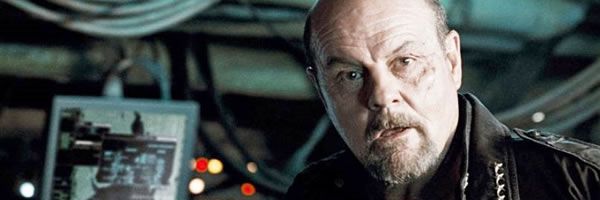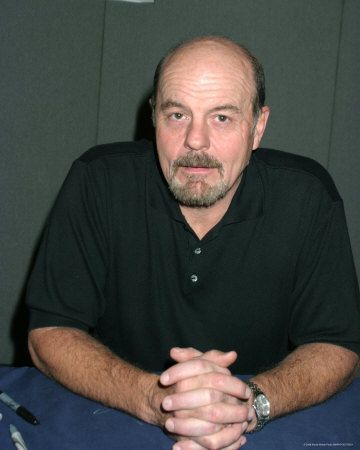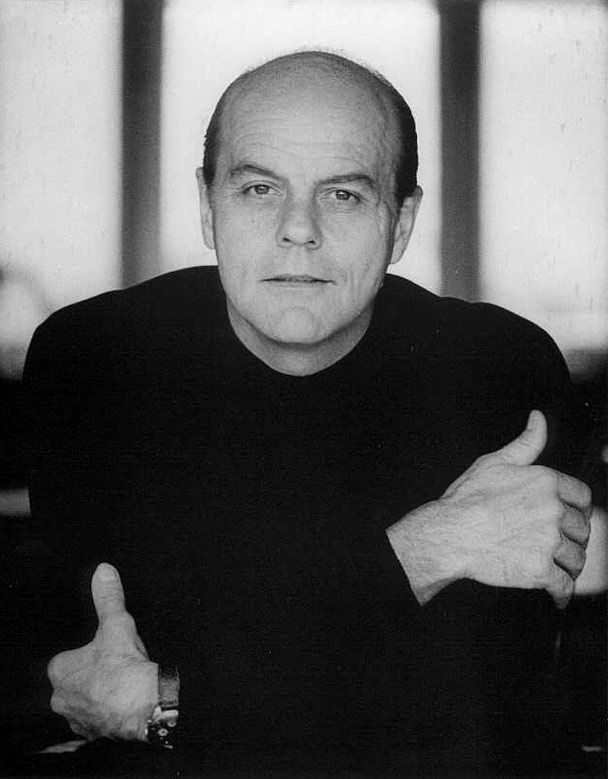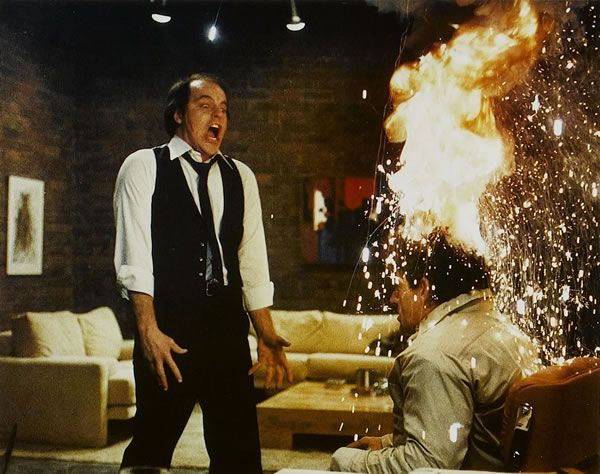From Top Gun, Total Recall, Starships Troopers, Free Willy, and many more, Michael Ironside always seems to find an audience no matter what role he accepts. Now, he plays Chief Bannen, a police chief with a mobster brother and con artist son, in the new web series The Bannen Way over at Crackle.com from Sony Pictures. Seemingly being on top of the New Media game, I also spoke to him about his decision to reprise his role as Sam Fisher in the popular Splinter Cell video game series, with the 5th installment ready to land in stores in late April 2010, and also got him to divulge about his childhood love of Superman and how it helped lead him to voiceover work as one of the Man of Steel's most nefarious enemies, Darkseid.
Hit the jump to read or listen to the interview:
If you'd like to listen to the interview, click here. Otherwise, below is the transcript.
-
Ray Carsillo (Collider): Hey there everybody, this is Ray Carsillo and I have the distinct pleasure now of talking with a man who has hundreds of screen credits over the course of his career. I mean, literally, the list is the length of my arm folks, but for all of us comic book and maybe video game geeks out there we may know him better for his countless voiceover credits including Darkseid from the Superman cartoon and of course a little guy you might not have heard of. I don't know. Sam Fisher from Splinter Cell? Is that pretty popular? Yeah, I think so. I have the pleasure now of talking with Michael Ironsides! Michael how you doing today?
Michael Ironside: I'm doing real well. It's a little cold and wet in Los Angeles at the moment.
RC: Well, it's not much better here in New York. A little bit of weather parallel I guess. But right now, you're working on a web series called The Bannen Way, it's on Crackle.com, it's from Sony Pictures, and the first question I have to ask you about is why do a web series? Somebody with your great list of credits, why would you decide on doing a web series like this?
MI: I don't think the end product really kind of figures into it for it. It's the writing and when I was introduced to this property, I just found the writing to be exceptional. It's very witty, very cleverly written, and very solid definable characters. Jesse Warren, the writer/director and Mark Gantt, a friend of theirs sent it to me, I looked at it and went "wow" and it's kind of rare. For every hundred scripts I get, there's probably one that hits me like this. I met with them and they were as pleasant and as talented as their script and we did it. As far as it being a webisode, how you cook the pie, it's still a pie. How you cut it up and deliver it is a different deal. It doesn't really affect the way something is shot or how something is handled on set.
RC: Very cool. You're starting to see a lot of web series really start to gain some traction online and in the media, and obviously at the forefront of the New Media surge. Do you think that's the future? Do you think that television and radio and these other, more traditional, mediums will see this cut into their viewership, especially when producing such high quality content like The Bannen Way?
MI: I've been around long enough to watch this happen. I've been around to watch television and movies sort of fight it out and find a balance between themselves and I think it's the nature of our times and money and you can't just make a pilot or shoot something and if it doesn't work throw it away. It has to have more than one life to it. For example, this project, The Bannen Way, as far as I know, it starts as a webisode, then it'll go to a DVD or MOW, movie of the week, sort of format, and then it is also being used as a pilot as a network series. For a project to be, I think, financially responsible and fiscally responsible, it has to have more than one revenue scheme and I hope these guys do well with it.
RC: You mentioned Mark Gantt, and of course, he is not only one of the writers, but also the star playing Neal Bannan.
MI: Yeah, he plays my son.
RC: I was going to say, talk a little bit about your character. Your son's a con artist and you're the chief of police. How does that dynamic work and talk about the character some.
MI: Well, Mark is a mercurial guy as it is, very clever, a very likable guy. His character is a kind of flash about town con man who likes women and cars and gambling. I play his father who is kind of a stone-age chief of police and my brother, who is played by Robert Forrester, is the local mafia kingpin or crime boss. We're the yin and yang of Mark's life and the story is basically revolving around him owing his uncle $150,000 on a gambling debt and how he is trying to contort and run around town to get that money. And at the same time, I'm trying to get him to turn over evidence on his uncle, my brother, so I can put him away. It's a very clever story, very enjoyable.
RC: You always seem to play these, like you said a stone-age police chief, a general, or a high position of authority. Do you sometimes get typecast into that and how hard is it to sometimes branch out away from that?
MI: Well, I don't think it's difficult if you're willing to do different things at different economic levels. I mean, most people know the mainstream stuff I've done from like Top Gun, Total Recall, Starship Troopers, Free Willy, T4, those sort of things, but for every large film I get to do about four or five small ones that are really my choice. Like last year, I did something called The Jazzman, where I'm playing a saxophone player who is dying of cancer. It was loosely based on Mo Kaufman's life. I get to take that opportunity based upon the fact that I can affect distribution from doing larger pictures. I've been around a long time. I'm never going to be the lead actor guy. I'm real quiet and real happy and real fortunate to keep working. It's what I do. It's like the circus. I ran away and joined it a long time ago.
RC: As long as you're happy, that's all that matters, right?
MI: Heh, and paying the bills. That's what matters.
RC: I mentioned Darkseid before from the Superman cartoons and Justice League cartoons and you were also in a couple of episodes of Smallville. Are you a closet comic book geek or really big Superman fan?
MI: No. Well, growing up yeah I did. I was enamored with Superman because I thought, being Canadian and from Toronto, that the original series was based around Toronto. I remember as a kid being told that. That the Daily Planet was the Star Newspaper and the whole idea was based around that kind of small cosmopolitan city so that caught my attention. I don't know. I just like trying things. The voice work with cartoons and stuff has worked, but I'm not interested in doing that stuff at all for commercials and stuff, but it is kind of fun to get in a room with a bunch of other actors and have the freedom of not being watched so you can sort of take risks with a character like Darkseid or the Sam Fisher character in those Splinter Cell things. It's fun to work. It really is. It's not all just hit your mark, take your money, and go home. It's fun. It's creative. It's challenging. You get to meet great people.
RC: That's great. Not a lot of people out there get to really love what they do and you really seem to enjoy it. That's a great thing in life.
MI: My dad referred to it that I ran away at a very early age and joined the circus and I think it is quite apt. It's a great way to live. You get to move from family unit to family unit, from set to set, from project to project where you're thrust into a very intimate, very honest relationship with people and you have to either tell the truth and step up or it can be a really horrific situation if you try and manipulate it every time and over 40 years I've met a lot of great people.
RC: Is it hard then, you describe it as a family unit, when the project wraps up and you have to kind of move onto the next project? Is it a sad moment there?
MI: Yeah, absolutely, but I would like refer to it as postpartum. I've gotten to the point over the years that I actually get it before the film is over and I start getting a little bit of melancholy over the last few days of a project when I look at people. But, you get to see those people again, just not in that family unit or configuration, but man it is a great way to live.
RC: We mentioned Sam Fisher earlier and it is one of the most successful and beloved shooters of all time and you really breath a unique life into that character. Did you ever get into games? Are you a gamer? Do you have an Xbox 360 or PS3? Ever pick up the controller after the game is finished?
MI: Yeah my daughters are into that and the gaming, but I'm not a gamer. I don't physically translate to that way of doing things. I'd rather get out there and do it myself. I don't mean kill somebody though, haha.
RC: Yeah strap on the night vision goggles and go crawl in the shadows, haha.
MI: No, it's like people go online golf, not to take a shot at the game, I just would rather be out there doing it. But no, Splinter Cell was interesting because I actually passed after the fourth game. I didn't think we could take it any farther and wasn't really interested in doing such and they came back at me with a fresh look at the character and a new way of doing things and the new artwork and we just finished the fifth one. It'll be out I believe in about two months.
RC: Yes, actually Ubisoft just announced that it got pushed from a late February release to a late April release.
MI: And ya know, I think that is to their credit. They were actually going to, there were parts of the company anyway, that were going to try to force the game out for Christmas and they opted for the quality rather than quantity and I think that speaks for Ubisoft to give up a huge payday or a rushed payday on an old title like that and force it through on Christmas. And I'm not kissing their a** here. It's just rare that you find something in a corporate level that makes organically sound decisions and they did that. And they pushed it again to make sure they get it right. Yeah I was supposed to go out and do the release and stuff like that, but I just got the call the other day saying they're going to push it back another month and a half, which is cool. Get it right!
RC: Definitely, as a gamer, we would rather you take the extra month and a half and get it right, especially for such a beloved series.
MI: Yeah and there is a lot of money involved here. People put a lot of money on these games. I remember I was on a plane somewhere and somebody stepped up and said "Sam Fisher?!" I had ordered some bloody drink or something and I then started talking to them and they were talking about how it keeps them as a family unit these online games, where they sit and play with family members from different places in the world and stuff like that or have conversations with different people in different places around the world and I never thought that a game, an internet game, would be the kind of meeting place where people could exchange ideas and real truths about each other and stuff like that. It's kind of a strange world when you can trust a game format or platform more than the network news.
RC: Yeah, it's insane how far games have come in the past couple of decades. Would you say Sam Fisher is the character you're most recognized for or most approached about?
MI: Not really. I think it goes generationally. I've been around a long time. If someone walks up and says "Jester's dead" then I know it's from Top Gun, and they're probably in their 30s-40s. If they walk up and say something like "I hate that whale!" then they're probably in their late 20s, that of course from Free Willy. Or "See you at the party, Richter!" or something like that. It depends on where these people are coming from. It seems like every six or seven years I hit on a big box office film and people get to regurgitate specific lines from the film. As for Sam Fisher, I'm totally anonymous until I open my bloody mouth and people recognize the voice.
RC: Do you ever get to chill with Tom Clancy? Do you ever get to say "Hey Tom, maybe Sam would do this in this situation?" Since the character is really you, do you ever get to influence what he does a little bit or go to Tom Clancy?
MI: No, but what I did do was that I turned it down at the beginning. I wasn't interested in doing it because structurally the way the character was built was that I thought "I don't want to do this." And they asked what was wrong and I said "Well, he is too monochromatic. There isn't enough humanity in the character. There is no conflict underneath his decisions." It was interesting, when we first went in to do the first game, I actually did it up in Montreal at the Ubisoft labs and I had them bring in other actors since these things are usually done singular evidently where you bring in one actor at a time and it was my first big game. So I had them hire some actors so I would have somebody to work with as we worked the character up in the dialogue. And it really worked. It is the nature of communication that if you want to play tennis or play a game with somebody, you need to talk and have a conversation. You them there, otherwise it is just sort of like masturbation. And I'm not a big fan of that. Though it has its place, believe me.
RC: Of course, of course. I'm not going to go into any further detail there, but you've had such a long career as you had mentioned and you've been around for so long that you did a series in the 80s called "V" and of course they have kind of come back with that, a new iteration of it that is based on the series you were in. Do you ever think that you might ever want to get back into the series, maybe as a guest cameo to link the two?
MI: There was that talk, but I really wasn't interested. The original character of Ham Tyler that we built in the mid-80s for that original format and that original show, to revisit that and revisit that character would do that whole show a disservice. It is really a different animal now. They have computer generated graphics now while we were using puppets and everything in those days. We were sort of making it up as we go, to the best of our abilities. And no I think Ham Tyler that they sent him to Chicago in that original series, where I wanted him to go. I got out of the show so I could go do Top Gun and the Richard Pryor film. No, I don't think I'd want to go back and do it. It's like going back and driving an old car. It had its place in time. I had a '55 Chevy that I had for a lot of years and it was a cool car, but if I had to use it every day, no, it had its time and place.
RC: I hear you. That's a great analogy. Aside from The Bannen Way, which is of course at Crackle.com right now from Sony Pictures, and Splinter Cell: Conviction, which is coming out in April from Ubisoft, what else can we see from you in the future?
MI: That film I did last year, the film called The Jazzman, based on Mo Kaufman's life, the horn player who died of cancer and was written by his grandson. I think it is coming out, or is out now, or will be out soon. I don't really follow the things. And a thing I did in Romania called Eva, which is a historical piece.
RC: Alright, very cool. Thank you very much Michael. Of course, the web series is The Bannen Way which is available now at Crackle.com from Sony Pictures, the video game is Splinter Cell: Conviction which will be out for Xbox 360 and the PC later in April, and of course the man is Michael Ironside! Michael thanks for the time.





